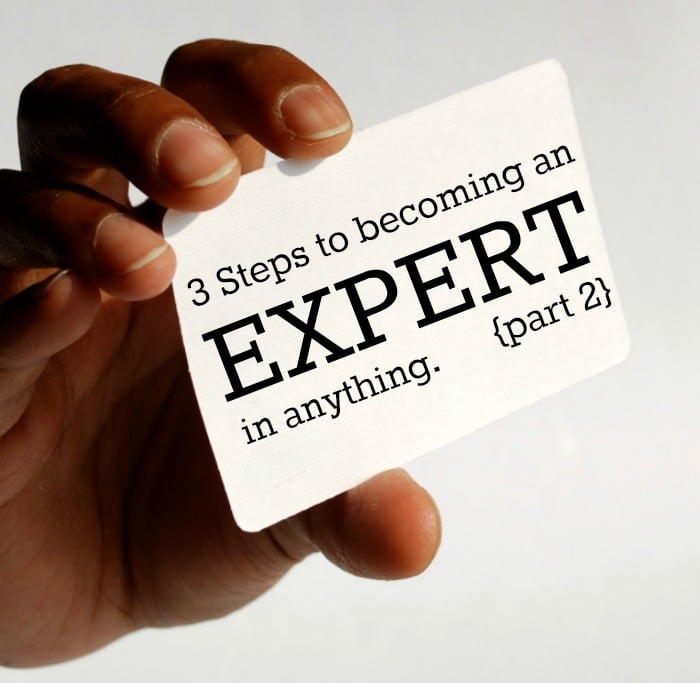Part 2: The Master’s Degree. Once you’ve made yourself familiar with the fundamentals of your own field of interest, as well as other complementary topics, you are ready for StepTwo.
To continue the university metaphor, this is the mirror of a master’s degree – the step where you master what there is to know in your field. How do you do this? It’s straightforward process of three steps:
1. Find out who the experts are & stalk them (in a really respectful way).
You probably heard the same names come up over and over when you were working on step one. Begin there. Choose three or four of them who are a) alive, and b) engaged. By engaged I mean that they have a blog or they are on Twitter or they are somehow connecting. Don’t pick people who are the Bobby Fischers of your field. That won’t help you.
Follow them everywhere they are (not literally – I mean in their outlets) and begin to engage. Comment on blog posts with something reasonable to say (not just “great post!”). Eventually, you will be able to be to connect with them on LinkedIn or through email. I was able to connect with two of my faves, Sally Hogshead and Dan Pink, on LinkedIn after a couple of years of following them on Facebook/Twitter/reading all their books, actually using what they say in things I write and say, and really knowing what their message is. I’ll be honest: I was a little starstruck.
Look to see who your big names are following or talking about, and add them to your list. It’s a six degrees of separation kind of thing in most fields – the same people know the same people – and pretty soon, all the names will start to sound familiar.
2. Read. Repeat.
If you don’t like to read to the extent that you won’t read, you will have a much more difficult time becoming an expert in virtually any field. Of course, if that were an issue for you, you wouldn’t be reading this, now would you? So let’s assume you are willing to read. What should you read?
The answer sounds like a sandwich: B, B & J. Blogs, books, and journals.
Blogs: Find the meta-blogs of your area of interest. What I mean by meta blogs is this: you’re looking for the blogs of the people who stay on top of trends in your field, not only the blogs by individuals who are writing primarily about their own stuff. You are doing that already for a few of the top dogs in the field (see Step 1 above), but you need to find the people who are casting a wide net.
To find the blogs, turn to your friend Google and search “best blogs about underwater basket weaving” or whatever it is you’re trying to become an expert in. Check them out, selecting perhaps five to start. See who they link to for more ideas.
You need a good way to keep all of this content organized, so check out this article on how to get a good aggregator to keep all of that information flowing smoothly.
Books: You know those ads in Skymall magazine for that service that takes the top business books and condenses them to five minutes of material so you can act smart at meetings? Yeah, that’s not for you. You need to actually read books.
When I was an English teacher, a colleague taught her students six pages of The Adventures of Huckleberry Finn, while I invited my students to enjoy the complete novel. One of them once asked why (silly, silly child), and I said, “Because I don’t want you to be at some social function where a colleague says, ‘Did you read Huckleberry Finn?’ and you have to say, ‘I read six measly pages.’” This is not what I want for you, either. Read the whole book. Read the books by the people you are stalking in Step 1.
Journals: Subscribe to the journals of your field if you are rolling in money in manner of Donald Trump. If you are not, use your local library to access databases and use them to find (and, ahem, read) at least one journal article a month in your field.
Why? Because if you never read the original research, you will always be at the mercy of the translators. You will only know what other people think you should know, and that is not mastery. You need to read in the original sometimes. It’s good for you. You will find the articles you want to read by reading the blogs we talked about in Step 1. Someone will mention a study, and off you go!
Just so that you don’t get too erudite in an annoying way from reading too many articles with tables and large n values, subscribe to (or check out of your local library) some magazines in your field, as well as your analogous and complementary fields. My fave site to order magazine subscriptions very cheaply is Best Deal magazines. They have a plethora of subscriptions available at $4.69 a year, and coupon codes abound on the internet as well. The magazines will give you a good feel for the language of your discipline as you start to see trending phrases and words.
3. Join the conversation.
The last step in this level is to actually join the conversation. Here’s how you do that:
Go to conferences and/or trade shows, and after you’ve gone to a couple, present at them. When I took a graduate seminar with Dr. Desiree Henderson, she said to us, “You are no longer students. You are now scholars. It’s time to act like scholars, and scholars present at conferences.” She was right, and she helped launch a conference attendance and presentation hobby of mine that has been one of the key elements of my acquisition of knowledge in my field. This site will tell you where to find academic conferences and this one is even more broad, including trade shows and conventions.

Whew! Still with me? Bravo! You’re 2/3 of the way there. Be sure to read Part 3 for how to take the last step towards expertise. Remember, if you missed Part 1, you can read it here.






